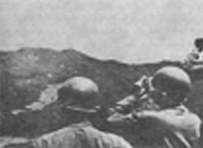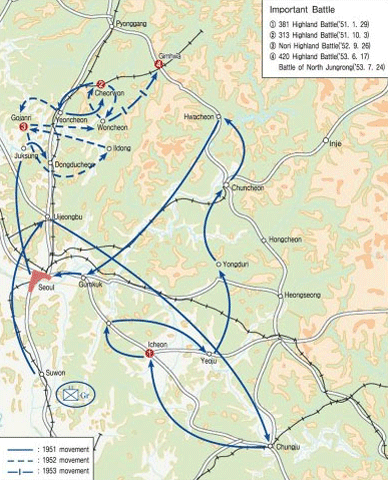 Greece
Greece
List for UN Allies
Battle of Hill 381 in Icheon (1951. 1. 29~30)
This was the battle in which the Greek battalion after being attached to the U.S. 1st Cavalry Division fought for the first time against the 334th Regiment of the Chinese Communist Army 112th Division. After capturing Icheon during the Counteroffensive Operation which began on Jan. 25, 1951, the Battalion was preparing to attack the Chinese Communist Army's defense line near Hill 381 during the northward advance but was attacked by the Chinese Communist Army by surprise on the night of Jan. 29. The Chinese Communist Army attacked Hill 381, the most important hill, from the front three times, but the Greek Battalion dominated the enemy's attack unit with the efficient use of illuminating shell and the support of artillery unit and defended Hill 381 by defeating them with close-range combat. The Greek Battalion accomplished many achievements with very little loss in this battle. As a result of this battle, the strength of the Greek Battalion was highly regarded and troops started to show confidence in a fight against the Chinese Communist Army.

Battle of Hill 313 in Yeoncheon (Scotch Hill, 15km North of Yeoncheon:1951. 10. 3~5)
This was the battle in which the Greek Battalion fought against enemy units under the command of the Chinese Communist 141st Division and the 140th Division at Hill 313, north of Yeoncheon. Attached to the U.S. 1st Cavalry Division, the Battalion participated in the limited attack operation (Commando Operation) to improve the defense line and attacked 313 Hill occupied by the Chinese Communist Army at that time. The assault unit reached the target area after 2 attacks on Oct. 3 and Oct. 4, but casualty was mounting due to the Chinese Communist stiff resistance and reinforcement.
Therefore, it retreated for the moment, but captured the hill on Oct. 5 after another attack with air and artillery support.
Battle of Nori Hill (12km West of Yeoncheon; 1952. 9. 29~30)
This was the battle in which the Greek Battalion fought against the 348th Regiment of the Chinese Communist 116th Division at the Nori Hill in the bending area of the Imjin River. While facing the Chinese Communist Army in the Daenori hill about 200m distance from the Sonori hill, the Battalion attacked and captured the Daenori Hill on the dawn of Sep. 29. The Chinese Communist Army who lost this hill from this attack began a counterattack immediately without allowing the Greek Battalion to strengthen its position. The enemy made 5 attacks during 4 hour period. The Greek Battalion repeatedly defeated them but it was severely damaged by the U.N. aircraft's mistaken bombing during the 5th attack and it was forced to retreat from its position. After the unit was re-equipped, it later attacked the Daenori Hill and recaptured it. It again had to retreat from the hill following the order while fighting against a Chinese Communist counterattack. Later, this battle line was transferred to the South Korean 1st Division and fighting to take this hill continued.
Battle of Bukjeong Pass (10km Northeast of Kimhwa ; 1953. 7. 20~26)
This was the battle in which the Greek Battalion after being attached to the U.S. 3rd Division fought against enemy units under the command of the Chinese Communist 130th Division defending the main defense line of the Seungam pass, south of the Bukjeong pass. After taking over the duty of defending the main resistance line on Jul. 20, the Battalion defeated the last offensive continued until Jul. 26 by the Chinese Communist Army intending to expand their territory before the cease-fire following the momentum carried out from '7.13 Offensive' and it met with the cease-fire agreement on Jul. 27. The U.S. Brigade Commander at that time insisted to pull out from the area before the battle to minimize loss before the cease-fire, but the Greek Battalion continued to defend the defense line by requesting more fire power support while considering the serious effect that may be caused by its withdrawal. As a result of this, the Seungam pass was included in the south side after the cease-fire agreement was signed. After the cease-fire agreement, the Greek Air Force was withdrawn in May 1955 and Ground Troops in Dec. 1955.
